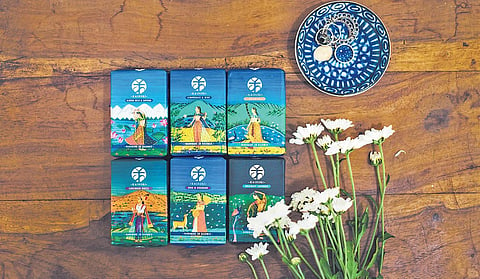

Recently, well-known beauty and wellness blogger Vasudha Rai took to Instagram and called out big beauty and cosmetic giants for their wasteful practices in packaging. Subsequently, we saw Shahid Kapoor's wife Mira Rajput, an advocate of sustainable beauty, condemn the use of toxic chemicals in beauty products.
Brands woke up and took notice. In the face of being increasingly questioned, even being shunned, we’re seeing the rise of purposeful beauty. It’s still at a nascent stage but holds tremendous promise.
Brand value
For long, the brand name has been enough for consumers to pick a product. Not anymore.Youngsters today are interested in the foundational value, ethos, system of working, social impact and environmental consciousness.
Owning a clothing brand involved in reducing environmental impact, Anushka Agrawal Lakhotia's switch to Kalyashastra and ONEarth was powered by the fact that the brands were ideologically sustainable.
"I chose them for being environment friendly, ethical and natural," she says, adding, "ONEarth’s bamboo makeup removing wipes are reusable. I can’t believe how much waste I’d been producing!"
When it’s an environmental initiative, it becomes a science-based experiment. "It also is a tedious task to convince the audience because the thesis of climate change is recent in India. Hence, the work has to be solid," says ONEarth's Sonal Gupta.
Award-winning company Pure Earth sends out disclaimers that their pre-mix bases, fillers, synthetic colours, fragrances and additives are not part of their approach. Their potions are free from preservatives, parabens, phthalates, palm, formaldehyde, silicones sulphates, carbomers dea and other harmful chemicals.
Zero waste, please
Ethical, clean brands are taking the bull by the horns through conscious packaging. The focus is on bio-degradable or recyclable containers (Innisfree uses paper packaging). The Tribe Concept’s products come in steel containers with a steel spoon, making them cent percent re-usable.
The element of surprise works in favour of several brands. For instance, ONEarth's cork yoga mat has customers exclaiming, "You’ve got a mat made out of cork!" A certain inquisitiveness for raw materials such as cork, bamboo, coir, tori, coconut shell wastes spur a desire to explore.
Simple is trendy
Millennials have the cash and the brains. They’re more interested in age-old DIY kitchen remedies, ayurvedic cures and alternate therapies. Basabdutta Adhikari, an educationist, got magical results using oils from Juicy Chemistry and cleansers from The Tribe Concepts. "I could sense the difference. When it comes to personal care, the investment makes sense if the effects are positive. It’s about finding harmless beauty solutions," she says.
Purposeful all the way
Producers incessantly declare the benefits of natural ingredients, age-old formulas and derivatives of kitchen concoctions. Artist Pornima Bhickta’s take is that these products feel natural and lighter. "I broke out with any normal foundation or BB cream but the Soul Tree BB cream did not cause any such issue. The shampoo bars I use feel gentle on the hair," she says.
The skin being the largest organ, it has to be mindfully fed. Entrepreneur Deepika Agarwal remarks, “Natural products are less likely to react. You can harness the benefits by using them for multiple purposes. Like, rose powder is a good facepack, body scrub as well as a simple foot soak. Clean products are essentially dadima ke nuskhe.”
Cost Cutting
Production in limited quantities being opposed to economies of scale, the wee higher pricing could act as a deterrent for this plunge. Breaking grounds of gender neutrality, clean labels have takers among young males too. Says PR professional Akshat Kapoor, "Such products keep certain parameters in mind, hence the pricing. But, with more conscious companies entering the wellness market, the prices are bound to get competitive, thus affordable."
This growing industry would be cost-effective only if one can scale, opines Emily Chakraborty, owner of Kaisori India, producing handcrafted apparels and beauty products."Consumersare willing to pay for quality," she says. The road ahead depends on the audience’s perception of beauty as well as core components of clean brands.
Junaili Apothecary
Apricot scrubs, Rose face mist and Apricot face oil, handmade in small batches from finest wild apricots and botanicals of Nainital.
The Tribe Concept
Powered by nature and Ayurveda. Try the organic body cleanser with over 15 natural ingredients and the oils.
Blend it Raw Apothecary
Promoting the idea of a home spa by pampering skin with herbs and plants. Read DIY.
Earth Rhythm
Shampoo and conditioner bars, serums, kohls and lipcolours. The packaging is plastic free, too.
ON Earth
Their ideology is based on sustainability and inclusivity of skin types. Try the coconut soy wax candle, cork yoga mat, bamboo toothbrushes, coconut travel cutlery and washable bamboo makeup removing wipes (can be reused 200 times).
Kaisori
The products are infused with the goodness of natural ingredients from Kashmir. The packaging is plastic-free. Try their Almond Walnut scrub, Saffron pack and other items.